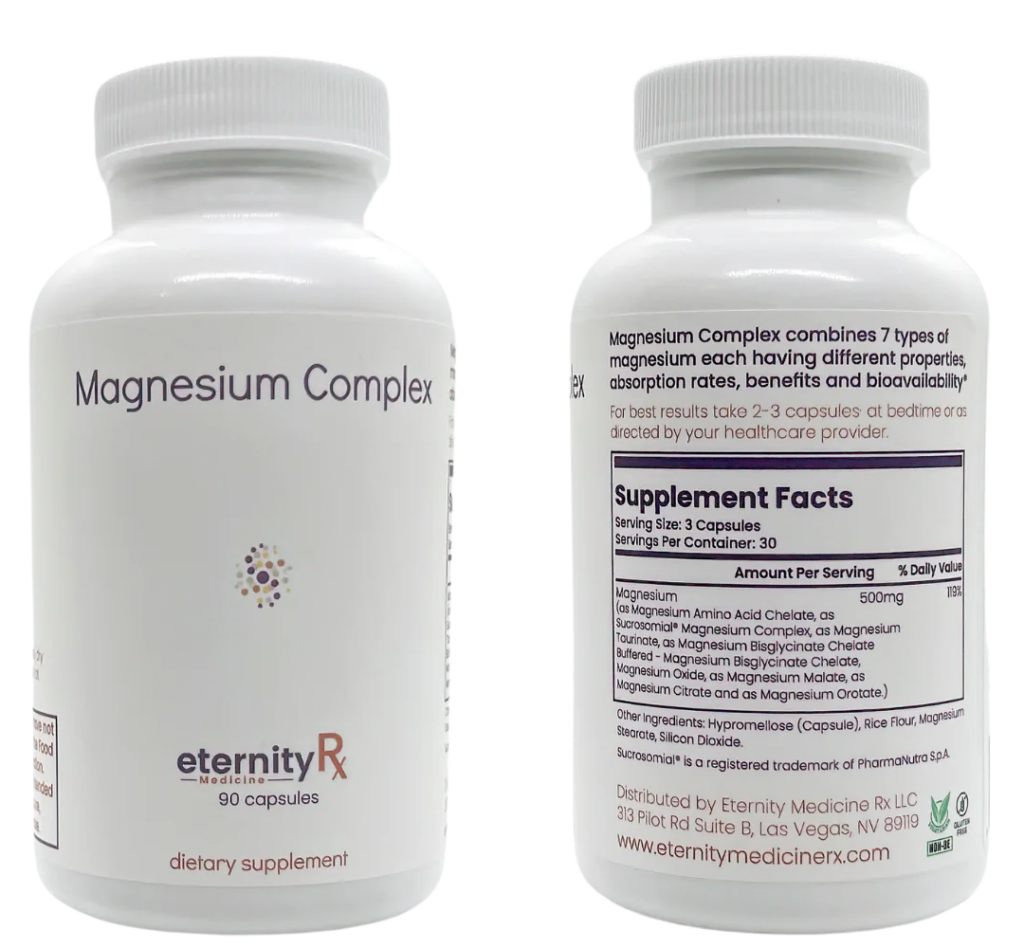Ten Health Benefits of Magnesium & Magnesium Complex Supplements
Magnesium is an essential mineral that plays a crucial role in numerous bodily functions. Despite its importance, many people do not get enough magnesium from their diets. In this article, we will explore the 10 health benefits of magnesium and why you should consider ensuring you receive adequate amounts of this vital nutrient.
What Is Magnesium?
Magnesium is one of the 7 essential macrominerals, meaning it is a mineral we need to consume in relatively large amounts every day. It is involved in over 300 biochemical reactions in the body. It helps regulate muscle and nerve function, blood sugar levels, and blood pressure, and is essential for the production of protein, bone development, and DNA synthesis. The recommended daily allowance (RDA) for magnesium varies by age and sex, but many adults do not meet these requirements.
In most cases, low levels of magnesium in the body do not cause symptoms. However, if the magnesium deficiency persists for a long time, there is a risk of increased blood pressure, development of type 2 diabetes, and osteoporosis. That is why, those who don’t get enough magnesium from their diet should consider supplementation.
Recommended Daily Doses of Magnesium
According to some authorized sources, the recommended daily doses of magnesium are based on age:
- 1-3 years: 80 mg;
- 4-8 years: 130 mg;
- 9-13 years: 240 mg;
- 14-18 years: 410 mg (boys) & 360 mg (girls);
- 19-30 years: 400 mg (men) & 310 mg (women);
- 31-50 years: 420 mg (men) & 320 mg (women);
- people over 51 years: 420 mg (men) & 320 mg (women)
Pregnant women should increase their magnesium intake by approximately 40 mg per day during pregnancy.
Leaving aside the need to avoid risks associated with magnesium deficiency, adequate magnesium levels bring about important health benefits.
Top Ten Health Benefits of Magnesium
1. Supports Bone Health
Magnesium is crucial for maintaining strong bones. It works in conjunction with calcium and vitamin D to ensure proper bone structure. Studies have shown that a higher intake of magnesium is associated with increased bone mineral density, reducing the risk of osteoporosis.
How Magnesium Affects Bones
- Helps in calcium absorption
- Regulates hormones that affect bone health
- Reduces the risk of bone fractures
2. Aids in Muscle Function
Magnesium plays an essential role in muscle contraction and relaxation. It helps prevent muscle cramps and spasms, making it particularly important for athletes and those who engage in regular physical activity.
Benefits for Athletes
- Reduces the risk of cramps during exercise
- Enhances recovery after workouts
- Improves overall athletic performance
3. Regulates Blood Pressure
High blood pressure is a significant risk factor for heart disease and stroke. Magnesium helps to relax blood vessels, which can lead to lower blood pressure levels. Several studies have found that increasing magnesium intake can have a positive effect on blood pressure.
How to Incorporate Magnesium for Heart Health
- Include magnesium-rich foods in your diet, such as leafy greens, nuts, and whole grains.
- Consider magnesium supplements if dietary intake is insufficient.
4. Supports Heart Health
Magnesium is vital for maintaining a healthy heart. It helps regulate heart rhythms and is essential for the proper functioning of the cardiovascular system. Adequate magnesium levels can reduce the risk of heart disease and stroke.
Heart Health Benefits
- Reduces inflammation
- Improves cholesterol levels
- Regulates blood sugar levels
5. Enhances Mood and Reduces Anxiety
Magnesium has been linked to mood regulation and mental health. Low levels of magnesium have been associated with increased anxiety and depression. Supplementing with magnesium may help improve mood and reduce symptoms of anxiety. It’s actually one of the most popular of the ten health benefits of magnesium and one of the reasons many people take magnesium supplements.
How Magnesium Affects Mental Health
- Regulates neurotransmitters that affect mood
- May help alleviate symptoms of depression
- Promotes relaxation and reduces stress
6. Improves Sleep Quality
Getting enough magnesium can significantly improve sleep quality. Magnesium helps regulate melatonin, the hormone responsible for sleep-wake cycles. It also promotes relaxation by reducing levels of the stress hormone cortisol.
Tips for Better Sleep
- Consider taking magnesium supplements before bedtime.
- Incorporate magnesium-rich foods into your evening meals.
7. Supports Digestive Health
Magnesium plays a vital role in maintaining a healthy digestive system. It helps regulate bowel movements and can prevent constipation. Additionally, magnesium aids in the production of digestive enzymes that are necessary for proper digestion.
Magnesium and Digestion
- Promotes regularity in bowel movements
- Helps alleviate symptoms of indigestion
8. Aids in Diabetes Management
Magnesium is essential for insulin production and glucose metabolism. Studies have shown that individuals with higher magnesium intake have a lower risk of developing type 2 diabetes. Ensuring adequate magnesium levels can help improve insulin sensitivity.
Benefits for Diabetics
- Helps regulate blood sugar levels
- May reduce the risk of complications related to diabetes
9. Supports Immune Function
Adequate magnesium levels are essential for a healthy immune system. Magnesium helps regulate the immune response and reduces inflammation, which can enhance the body’s ability to fight off infections.
Boosting Immunity with Magnesium
- May reduce the risk of chronic diseases
- Supports overall health and well-being
10. Promotes Healthy Skin
Magnesium is beneficial for skin health. It helps maintain skin hydration, reduces inflammation, and can aid in the treatment of conditions like acne and eczema. Topical magnesium can also be used to soothe irritated skin.
Skin Health Benefits
- Reduces signs of aging
- Improves skin barrier function
Now that it’s clearer what the main ten health benefits of magnesium are, let’s see what happens if you don’t get enough of this vital mineral.
Hypomagnesia or Magnesium Deficiency
Magnesium deficiency is also called hypomagnesia and can be caused by:
- Alcohol abuse: it leads to digestive issues, poor magnesium absorbance and, implicitly, magnesium deficit
- Old age: it lowers magnesium absorption in the intestine. Moreover, seniors are often prescribed chronic condition medication that may reduce the body’s magnesium reserve.
- Various health conditions: digestive diseases can reduce the quantity of magnesium absorbed. For example, most of the magnesium is absorbed in the small intestine, which can be affected by Crohn’s or Celiac disease. Also, type 2 diabetes causes the kidneys to produce excess urine in order to reduce the high sugar level from the organism and, in the process, they also eliminate the magnesium from the body.
Magnesium Deficit Symptoms
- Appetite loss
- Nausea and vomiting
- Exhaustion
- Weakness
- Muscle cramps
- Numbness
- Tingling
- Convulsions
- Mood changes
- Heart rate changes
Hypermagnesemia or Magnesium Excess
The attempt to reap the ten health benefits of magnesium listed above may cause some people to exaggerate and reach hypermagnesemia, but that’s rare. Generally, hypermagnesemia appears as a result of treatments or renal insufficiency. When it does, symptoms include nausea, vomiting, dizziness, confusion, muscle weakness, and even paralysis. Extremely high magnesium levels may even lead to a heart attack. One way of lowering magnesium levels is intravenous calcium administration in case of an overdose. If the hypermagnesemia has renal causes, dialysis will be necessary.
Magnesium Overdose Risks
Magnesium overdoses from dietary sources are unlikely because the body eliminates excess magnesium through urine. Overdose following supplementation may lead to gastrointestinal distress like:
- Diarrhea
- Nausea
- Abdominal cramps
In rare and severe cases, symptoms may include:
- Kidney issues
- Low blood pressure
- Urine retention
- Nausea
- Vomiting
- Depression
- Lethargy
- Cardiac arrest
Best Sources of Magnesium: From Food to Supplements
If you’re looking to increase your daily dose of magnesium, eating more foods rich in magnesium should help.

However, meeting the body’s needs from food alone may be challenging, especially for someone on a busy schedule, forced to eat on the go, or for those on strict diets.
That’s where magnesium supplements come in. They ensure the adequate intake of the valuable mineral, without the headaches of planning and sticking to a magnesium-rich diet.
Ten Types of Magnesium
Choosing the best magnesium supplement is a daunting task, as there are ten types of available, each with different properties, benefits, bioavailability, and absorption rates.
- Magesium Chelate – Best for muscle building, health, and recovery
- Magnesium Citrate – Great for metabolic and cardiovascular health
- Magnesium Bisglycinate – Best for overall and muscular relaxation
- Magnesium Malate – Highest bioavailability (fruits) amond magnesium forms
- Magnesium Sucrosomial – Best absorption, energy boost, immunity and bone health support
- Magnesium Taurate – Best for the heart
- Magnesium Orotate – Good for the heart but especially for metabolic improvements and athletes’ recovery, energy, and performance.
- Magnesium Oxide – Most common form, inorganic magnesium salt
- Magnesium Sulfate – Lower bioavailability and higher risk of gastrointestinal side effects
- Magnesium L-threonate – May help with neuroinflammation and pain-relief
And there are just the most popular and widely available forms, there are even more, each with its own benefits. How do you get the best results? Instead of taking multiple magnesium supplements, consider using a supplement that combines several magnesium forms, a magnesium complex. For your safety and peace of mind, it helps to choose a trustworthy brand, endorsed by specialists.
Eternity Medicine Magnesium Complex
While reviewing magnesium supplements, especially magnesium complex options, we came across Eternity Medicine, a brand built by the reputed Dr. Graham Simpson from the Eternity Medicine Clinic, an Anti-Aging, Metabolic, and Holistic Health specialist, Board Certified in Internal Medicine and Emergency Medicine, renowned author, founding member of AHMA (American Holistic Medical Association) and adept of the 4 Hallmarks of Aging and I.N.T.E.G.R.A.L. proactive health systems.
Unlike most Magnesium Complex options on the market that combine three types of magnesium, the one from Eternity Medicine combines no less than seven, the first seven types of magnesium in the above list. Available for only $35, each bottle contains 90 capsules. The recommended dosage is of 2-3 capsules a day, preferably at bedtime, making one bottle enough for 1 month or 45 days.







